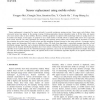Free Online Productivity Tools
i2Speak
i2Symbol
i2OCR
iTex2Img
iWeb2Print
iWeb2Shot
i2Type
iPdf2Split
iPdf2Merge
i2Bopomofo
i2Arabic
i2Style
i2Image
i2PDF
iLatex2Rtf
Sci2ools
122
click to vote
COMCOM
2007
2007
Sensor replacement using mobile robots
Sensor replacement is important for sensor networks to provide continuous sensing services. Upon sensor node failures, holes (uncovered areas) may appear in the sensing coverage. Existing approaches relocate redundant nodes to fill the holes and require all or most sensor nodes to have mobility. However, mobility equipment is expensive while technology trends are scaling sensors to be smaller and cheaper. In this paper, we propose to use a small number of mobile robots to replace failed sensors for a large-scale static sensor network. We study algorithms for detecting and reporting sensor failures and coordinating the movement of robots that minimize the motion energy of mobile robots and the messaging overhead incurred to the sensor network. A manager receives failure reports and determines which robot to handle a failure. We study three algorithms: a centralized manager algorithm, a fixed distributed manager algorithm, and a dynamic distributed manager algorithm. Our analysis and ...
Algorithm | COMCOM 2007 | Sensor | Sensor Network |
Related Content
| Added | 12 Dec 2010 |
| Updated | 12 Dec 2010 |
| Type | Journal |
| Year | 2007 |
| Where | COMCOM |
| Authors | Yongguo Mei, Changjiu Xian, Saumitra M. Das, Y. Charlie Hu, Yung-Hsiang Lu |
Comments (0)

